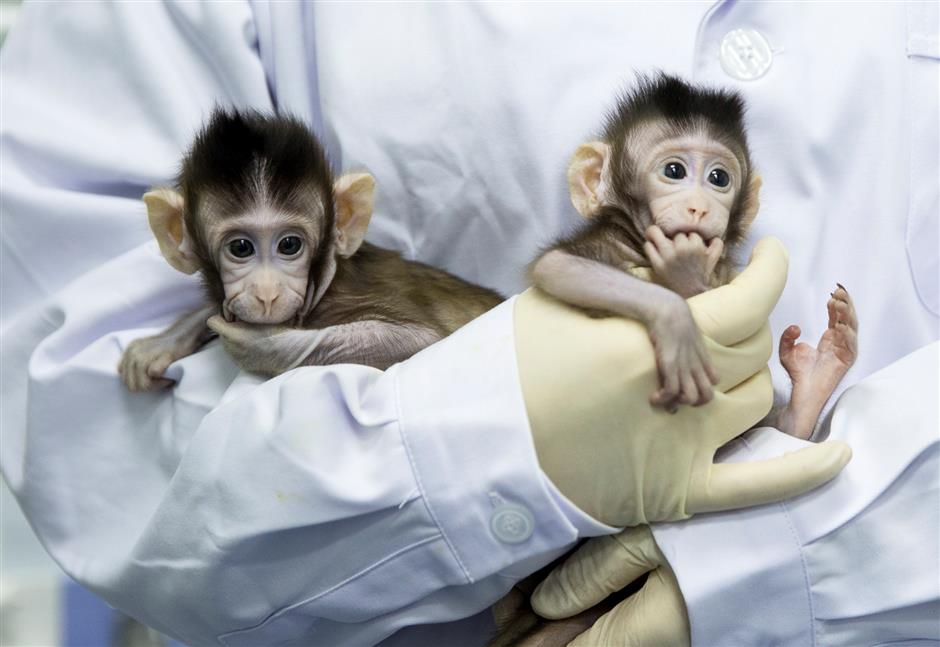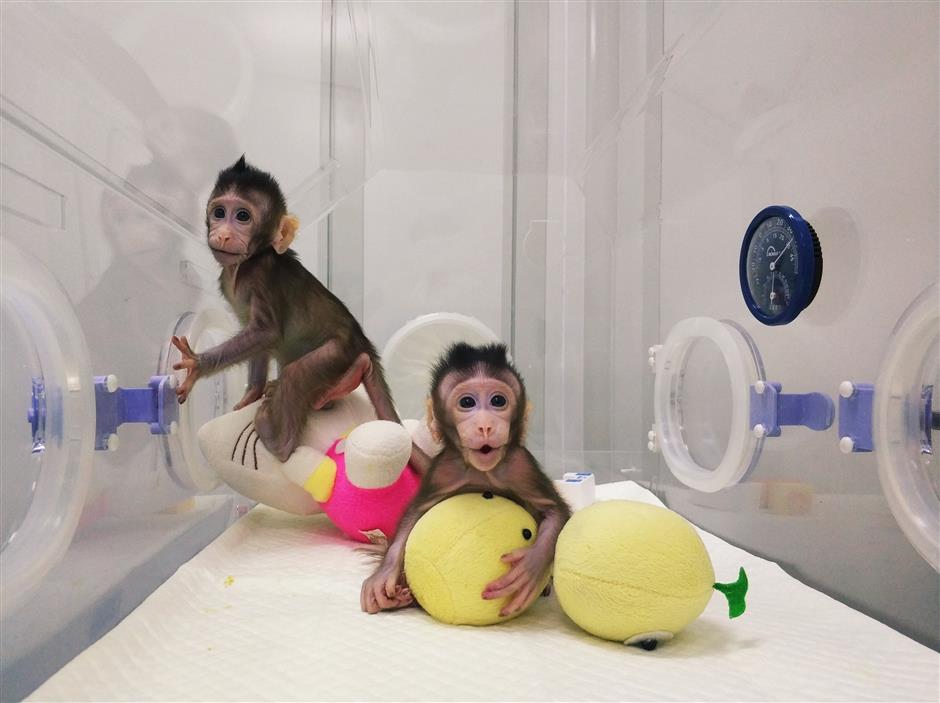22 years after Dolly, world's first cloned monkeys born in Shanghai
Chinese scientists yesterday announced the world’s first successful cloning of two monkeys using the technique that produced Dolly the sheep — the world’s first cloned mammal — in Britain 22 years ago.
The two cloned long-tailed macaque monkeys, both female and named Zhong Zhong and Hua Hua, were produced at a primate research facility under the Chinese Academy of Sciences (CAS) in Shanghai late last year.
Zhong Zhong was born eight weeks ago and Hua Hua six weeks ago. They are named after the Mandarin term for the Chinese nation.
The work aims to produce genetically uniform monkeys that could be used as models to understand human medical issues, said Mu-Ming Poo, director of the Institute of Neuroscience, Shanghai Institutes for Biological Sciences of the CAS and a co-researcher.
The achievement was published in the authoritative journal Cell yesterday.
“You can produce cloned monkeys with the same genetic background ... for genetically based brain diseases,” said Sun Qiang, director of the Nonhuman Primate Research Facility of the local-based institute. Sun led a group of researchers for three years to overcome the biological difficulties.
At present, the lack of treatments for most brain diseases can be attributed to the fact that the mice widely used in labs have a noticeable gap with humans in genome types, researchers said. Medicines coming out of the labs are often inefficacious or cause side effects. But cloned monkey models will make a difference.
“We plan to produce more cloned monkeys designed for gene-related brain diseases, such as the Alzheimer’s, Parkinson’s disease and autism. It will give us an international edge in the research of primate brains,” Poo added.

Two cloned macaques named Zhong Zhong and Hua Hua are held by a nurse at the Chinese Academy of Sciences’ primates research facility. China yesterday announced it had successfully cloned the world’s first monkeys via the method that created Dolly the sheep.
The monkeys are being bottle-fed and are growing normally compared with primates the same age. Sun said the lab is following strict international guidelines for animal research.
“We are very aware that future research using nonhuman primates anywhere in the world depends on scientists following very strict ethical standards,” said Poo. “Any abusive use could cause trouble.”
He stressed the team has no intention of applying their techniques to humans in spite of the technical breakthrough. CAS has its own ethics committee that will strictly evaluate the ethical concerns on each of its experiments beforehand.
Zhong Zhong and Hua Hua are the product of “somatic cell nuclear transfer,” the technique used to create Dolly the sheep in the United Kingdom in 1996. Dolly died from a progressive lung disease five months before her seventh birthday in 2003.
The same technique has been used to clone 23 different mammal species so far, including sheep, mice, cattle, pigs, cats and dogs.
Researchers examined genes in vitro and accurately sifted and produced somatic cells with the same genotype. They removed the nucleus from an egg cell and replaced it with another nucleus from differentiated body cells.
The reconstructed eggs produced embryos, which were put into the wombs of surrogate female monkeys, producing a group of cloned monkeys with the same genetic background.
The Chinese team started with 127 eggs, created 79 long-tailed macaque monkey embryos and implanted into 21 surrogate monkey mothers. Six of those became pregnant, and Zhong Zhong and Hua Hua survived, according to Sun.
The method will be further improved in the next step to increase the pregnancy and survival rates, said Sun.
The cloned monkey models will also advance nonhuman primate model making in China, said Poo.
In future, a hub for pharmaceutical research centers will be set up in Shanghai where companies can test new treatments for brain diseases, immunodeficiency or tumors on nonhuman primate models.
The hub is expected to produce over 20 types of genetic modified cloned monkeys annually for researches on various diseases and drugs, Poo said.



















